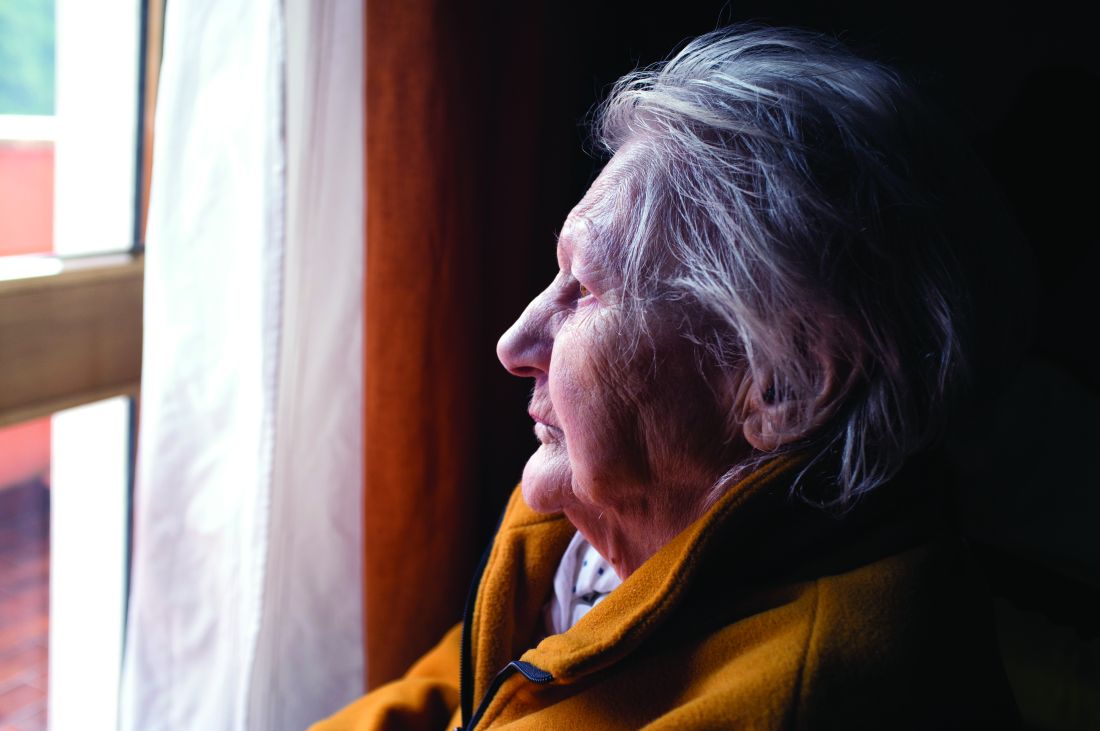User login
Older people are much more likely than younger people to experience a poorer clinical course of major depression, even after accounting for differences in social, clinical, and other health factors, new research suggests.
A longitudinal cohort study, published in the Lancet Psychiatry, examined baseline and 2-year follow-up data from 1,042 participants who had a recent diagnosis of a depressive or anxiety disorder in two previous cohort studies.
The authors adjusted initially for the number of major depressive disorder (MDD) episodes, comorbid anxiety, and antidepressant use but still found that older age was significantly associated with increased risk of a depressive diagnosis, a chronic symptom course, reduced likelihood of achieving remission, and a smaller decrease in depression severity.
They also adjusted for other factors common in old age, such as loneliness, social support, pain, other chronic disease, and higher body mass index, and again found that this only led to small reductions in the association with older age. However, the adjustment for loneliness did have the effect of dissipating the association between older age and the presence of any depression diagnosis.
“ and that are thought to worsen the course of the disease,” wrote Roxanne Schaakxs, PhD, of the Amsterdam Public Health Research Institute at VU University Medical Center, and her coauthors.
Researchers also looked for an effect of antidepressant use, in case the age differences might be related to differences in treatment response. “However, adjustment for antidepressant use at baseline did not substantially change our findings, and stratified analysis for participants who did and did not use antidepressants revealed consistent age–MDD course associations for both subsamples,” they wrote.
The authors said their findings suggested that age-tailored treatment might be needed for major depressive disorder, with a particular focus on maintenance treatment for older people.
The two cohort studies were supported by the Netherlands Organization for Health Research and Developments, NutsOhra Fonds, Stichting tot Steun VCVGZ, a NARSAD grant from the Brain & Behavior Research Foundation, and a range of universities and mental health care organizations.
One author declared research funding from Janssen Research and Boehringer Ingelheim not related to the study.
SOURCE: Schaakxs R et al. Lancet Psychiatry. 2018 Jun 7. doi: 10.1016/S2215-0366(18)30166-4.
While major depression appears to follow a worse clinical course in older people, this study is important in providing robust evidence of poorer prognostic outcomes and addresses some major methodological limitations of previous studies.
One limitation, acknowledged by the authors, is the absence of a sufficient measure of cognitive function. Cognitive impairment is associated with major depression, slows recovery from depression, and reduces treatment effectiveness. The study did exclude people with dementia or with Mini-Mental State Examination scores of 18 or lower, but this may not have excluded other variations in cognitive impairment that could have contributed to the age-related differences in outcomes.
Tze Pin Ng, MD, is with the department of psychological medicine at the National University of Singapore. These comments are taken from an accompanying editorial (Lancet Psychiatry. 2018 Jun 7. doi: 10.1016/S2215-0366[18]30186-X). No conflicts of interest were declared.
While major depression appears to follow a worse clinical course in older people, this study is important in providing robust evidence of poorer prognostic outcomes and addresses some major methodological limitations of previous studies.
One limitation, acknowledged by the authors, is the absence of a sufficient measure of cognitive function. Cognitive impairment is associated with major depression, slows recovery from depression, and reduces treatment effectiveness. The study did exclude people with dementia or with Mini-Mental State Examination scores of 18 or lower, but this may not have excluded other variations in cognitive impairment that could have contributed to the age-related differences in outcomes.
Tze Pin Ng, MD, is with the department of psychological medicine at the National University of Singapore. These comments are taken from an accompanying editorial (Lancet Psychiatry. 2018 Jun 7. doi: 10.1016/S2215-0366[18]30186-X). No conflicts of interest were declared.
While major depression appears to follow a worse clinical course in older people, this study is important in providing robust evidence of poorer prognostic outcomes and addresses some major methodological limitations of previous studies.
One limitation, acknowledged by the authors, is the absence of a sufficient measure of cognitive function. Cognitive impairment is associated with major depression, slows recovery from depression, and reduces treatment effectiveness. The study did exclude people with dementia or with Mini-Mental State Examination scores of 18 or lower, but this may not have excluded other variations in cognitive impairment that could have contributed to the age-related differences in outcomes.
Tze Pin Ng, MD, is with the department of psychological medicine at the National University of Singapore. These comments are taken from an accompanying editorial (Lancet Psychiatry. 2018 Jun 7. doi: 10.1016/S2215-0366[18]30186-X). No conflicts of interest were declared.
Older people are much more likely than younger people to experience a poorer clinical course of major depression, even after accounting for differences in social, clinical, and other health factors, new research suggests.
A longitudinal cohort study, published in the Lancet Psychiatry, examined baseline and 2-year follow-up data from 1,042 participants who had a recent diagnosis of a depressive or anxiety disorder in two previous cohort studies.
The authors adjusted initially for the number of major depressive disorder (MDD) episodes, comorbid anxiety, and antidepressant use but still found that older age was significantly associated with increased risk of a depressive diagnosis, a chronic symptom course, reduced likelihood of achieving remission, and a smaller decrease in depression severity.
They also adjusted for other factors common in old age, such as loneliness, social support, pain, other chronic disease, and higher body mass index, and again found that this only led to small reductions in the association with older age. However, the adjustment for loneliness did have the effect of dissipating the association between older age and the presence of any depression diagnosis.
“ and that are thought to worsen the course of the disease,” wrote Roxanne Schaakxs, PhD, of the Amsterdam Public Health Research Institute at VU University Medical Center, and her coauthors.
Researchers also looked for an effect of antidepressant use, in case the age differences might be related to differences in treatment response. “However, adjustment for antidepressant use at baseline did not substantially change our findings, and stratified analysis for participants who did and did not use antidepressants revealed consistent age–MDD course associations for both subsamples,” they wrote.
The authors said their findings suggested that age-tailored treatment might be needed for major depressive disorder, with a particular focus on maintenance treatment for older people.
The two cohort studies were supported by the Netherlands Organization for Health Research and Developments, NutsOhra Fonds, Stichting tot Steun VCVGZ, a NARSAD grant from the Brain & Behavior Research Foundation, and a range of universities and mental health care organizations.
One author declared research funding from Janssen Research and Boehringer Ingelheim not related to the study.
SOURCE: Schaakxs R et al. Lancet Psychiatry. 2018 Jun 7. doi: 10.1016/S2215-0366(18)30166-4.
Older people are much more likely than younger people to experience a poorer clinical course of major depression, even after accounting for differences in social, clinical, and other health factors, new research suggests.
A longitudinal cohort study, published in the Lancet Psychiatry, examined baseline and 2-year follow-up data from 1,042 participants who had a recent diagnosis of a depressive or anxiety disorder in two previous cohort studies.
The authors adjusted initially for the number of major depressive disorder (MDD) episodes, comorbid anxiety, and antidepressant use but still found that older age was significantly associated with increased risk of a depressive diagnosis, a chronic symptom course, reduced likelihood of achieving remission, and a smaller decrease in depression severity.
They also adjusted for other factors common in old age, such as loneliness, social support, pain, other chronic disease, and higher body mass index, and again found that this only led to small reductions in the association with older age. However, the adjustment for loneliness did have the effect of dissipating the association between older age and the presence of any depression diagnosis.
“ and that are thought to worsen the course of the disease,” wrote Roxanne Schaakxs, PhD, of the Amsterdam Public Health Research Institute at VU University Medical Center, and her coauthors.
Researchers also looked for an effect of antidepressant use, in case the age differences might be related to differences in treatment response. “However, adjustment for antidepressant use at baseline did not substantially change our findings, and stratified analysis for participants who did and did not use antidepressants revealed consistent age–MDD course associations for both subsamples,” they wrote.
The authors said their findings suggested that age-tailored treatment might be needed for major depressive disorder, with a particular focus on maintenance treatment for older people.
The two cohort studies were supported by the Netherlands Organization for Health Research and Developments, NutsOhra Fonds, Stichting tot Steun VCVGZ, a NARSAD grant from the Brain & Behavior Research Foundation, and a range of universities and mental health care organizations.
One author declared research funding from Janssen Research and Boehringer Ingelheim not related to the study.
SOURCE: Schaakxs R et al. Lancet Psychiatry. 2018 Jun 7. doi: 10.1016/S2215-0366(18)30166-4.
FROM THE LANCET PSYCHIATRY
Key clinical point: Older people experienced a worse clinical course of depressive disorders, compared with younger people.
Major finding: Older people with depression experienced slower remission and a higher risk of chronicity.
Study details: A longitudinal cohort study of 1,042 people with depressive or anxiety disorders.
Disclosures: The two cohort studies were supported by the Netherlands Organization for Health Research and Developments, NutsOhra Fonds, Stichting tot Steun VCVGZ, a NARSAD grant from the Brain & Behavior Research Foundation, and a range of universities and mental health care organizations. One author declared research funding from pharmaceutical companies that was not related to the study.
Source: Schaakxs R et al. Lancet Psychiatry. 2018 Jun 7. doi: 10.1016/S2215-0366(18)30166-4.

